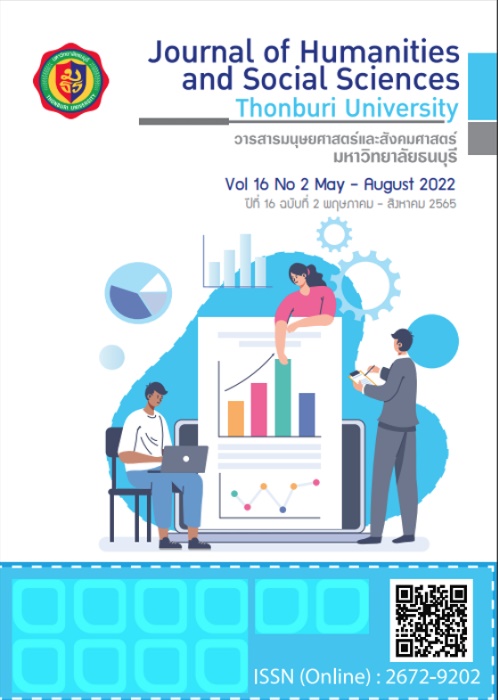อิทธิพลของบรรยากาศองค์การเชิงนวัตกรรมที่มีต่อพฤติกรรมการสร้างสรรค์นวัตกรรม การทำงาน ผ่านความสุขในการทำงาน และมีรุ่นอายุของพนักงานเป็นตัวแปรกำกับ
คำสำคัญ:
บรรยากาศองค์การเชิงนวัตกรรม, พฤติกรรมการสร้างสรรค์นวัตกรรมการทำงาน, ความสุขในการทำงานบทคัดย่อ
การศึกษาครั้งนี้มีวัตถุประสงค์เพื่อศึกษา 1) อิทธิพลของบรรยากาศขององค์การเชิงนวัตกรรมที่มีต่อพฤติกรรมการสร้างสรรค์นวัตกรรมการทำงานของพนักงาน โดยมีความสุขในการทำงานเป็นตัวแปรส่งผ่าน และ 2) อิทธิพลของความสุขในการทำงานที่มีต่อพฤติกรรมการสร้างสรรค์นวัตกรรมการทำงานของพนักงาน โดยมีรุ่นอายุของพนักงานเป็นตัวแปรกำกับ การศึกษาครั้งนี้เก็บรวบรวมข้อมูลด้วยแบบสอบถามจากพนักงานประจำขององค์การภาคเอกชนทั่วประเทศไทย จำนวน 394 ราย ผลการศึกษา พบว่า ความสุขในการทำงานเป็นตัวแปรส่งผ่านบางส่วนของอิทธิพลที่บรรยากาศขององค์การเชิงนวัตกรรมมีต่อพฤติกรรมการสร้างสรรค์นวัตกรรมการทำงาน และรุ่นอายุของพนักงานเป็นตัวแปรกำกับของความสัมพันธ์ระหว่างความสุขในการทำงานกับพฤติกรรมการสร้างสรรค์นวัตกรรมการทำงาน ณ ระดับนัยสำคัญทางสถิติที่ 0.05 ผลการศึกษาครั้งนี้เป็นประโยชน์สำหรับองค์การเชิงนวัตกรรมในการสร้างบรรยากาศขององค์การให้มีความเหมาะสมต่อการส่งเสริมให้เกิดพฤติกรรมการสร้างสรรค์นวัตกรรมการทำงานของพนักงาน
References
จิตรลดา พันธุ์พณาสกุล; และ วรลักษณ์ ลลิตศศิวิมล. (2562). การสร้างความได้เปรียบทางการแข่งขันด้วยเทคโนโลยีสารสนเทศและนวัตกรรมของธุรกิจโรงแรมในประเทศไทย : การทบทวนวรรณกรรม. วารสารบริหารธุรกิจเทคโนโลยีมหานคร. 16(2): 19-39.
Abdullah, A. G. K., Y. Ling, C. S. Ping; & Z. B. Yusoff. (2016). The Influence of Workplace Happiness towards Innovative Behavior and Affective Commitment Among the Teachers In Northern Peninsular Malaysia. RA Journal of Applied Research. 2(4): 445-450.
Bani-Melham, S.;& R. Zeffane. (2017). Determinants of employees’ innovative behavior. International Journal of Contemporary Hospitality Management. 30(3): 1601-1620.
Carmeli, A., Meitar, R.;& Weisberg, J. (2006). Self-leadership skills and innovative behavior at work. International Journal of Manpower. 27(1): 75–90.
Chatchawan. R; K. Trichandhara; & R. idsaratt. (2017). Factors Affecting Innovative Work Behavior of Employees in Local Administrative Organizations in the South of Thailand. International journal of social sciences and management. 4(3): 154-157
Cochran, W.G. (1977). Sampling Techniques. 3rded. New York: John Wiley & Sons.
Diener, E. (2003). Subjective Well-Being. Psychological Bulletin. 95(3): 542-575.
Fisher, C. D. (2010). Happiness at Work. International Journal of Management Reviews. 12(4): 384-412.
Hami, A. E.;& M. Batubara. (2018). The Role of Employee Work Happiness towards Innovative Work Behavior Among Lecturers in Indonesia. 10th International Conference on Language, Humanities, Education and Social Sciences. 36-41.
Ibrahim, H. I., W. M. W. Mohamad and K. A. M. Shah. (2018). Organizational Innovative Climate as a Predictor of Innovative Behaviour among Engineers in the Electrical and Electronic Manufacturing Industry. Review of Integrative Business and Economics Research. 7(2). 1-14.
Imran, R., T. Saeed, M. Anis-ul-Haq; & A. Fatima. (2010). Organizational climate as a predictor of innovative work behavior. African Journal of Business Management. 4(15): 3337-3343.
Janssen, O. (2000). Job demands, perceptions of effort-reward fairness and innovative behavior. Journal of Occupational and Organizational Psychology. 73: 287-302.
Munir, R.; & L. S. Beh. (2019). Measuring and enhancing organisational creative climate, knowledge sharing, and innovative work behavior in startups development. The Bottom Line. 32(4): 269-289
Nunnally, J. C. (1978). Psychometric theory. New York: McGraw-Hill Inc.
Sarwar, A., M. K. Imran, Z. Anjum and U. Zahid. (2020). How innovative climate leads to project success: the moderating role of gender and work culture. Innovation & Management Review. 17(4): 413-430.
Stevens, J. (1992). Applied multivariate statistics for the social sciences. 2nded. Lawrence Erlbaum Associates, Inc.
Woodman, R. W. (2008). Creativity and Organizational Change: Linking Idea and Extending Theory. Handbook of Organization Creativity. New York: Taylor & Francis Group.
Wuryanti, K.; & W. O. Surian. (2018). Achieving sustainable competitive advantage through product innovation and market driving. Asia Pacific Management Review. 23: 186-192.
Zemke, R.; C. Raines, & B. Filipczak. (2000). Generations at Work: Managing the Clash of Veterans, Boomers, Xers, and Nexters in Your Workplace. New York: AMA Publications.
Translated Thai References
Phanpanasakul, J.; & W. Lalitsasivimon. (2019). Creating Competitive Advantage with Information Technology and Innovation of Hotel Business in Thailand: Literature Review. MUT Journal of Business Administration. 16(2): 19-39. (in Thai)
Downloads
เผยแพร่แล้ว
How to Cite
ฉบับ
บท
License
Copyright (c) 2022 สุขมงคล เลิศภิรมย์สุข

This work is licensed under a Creative Commons Attribution-NonCommercial-NoDerivatives 4.0 International License.
ผลงานที่ปรากฎในวารสารฉบับนี้เป็นลิขสิทธิ์เฉพาะส่วนบุคคลของผู้เขียนซึ่งต้องรับผิดชอบต่อผลทาง กฎหมายที่อาจเกิดขึ้นได้และไม่มีผลต่อกองบรรณาธิการ





